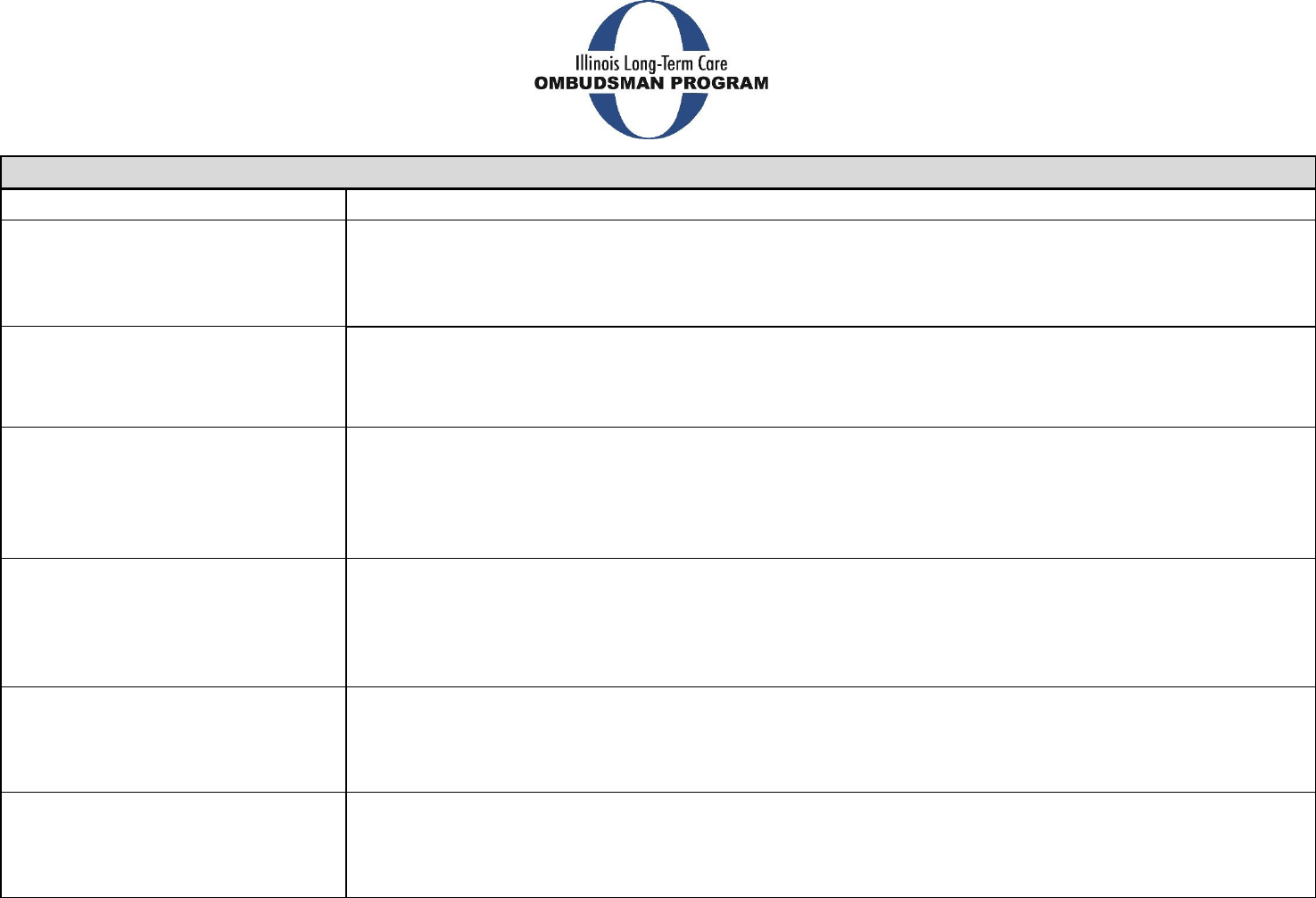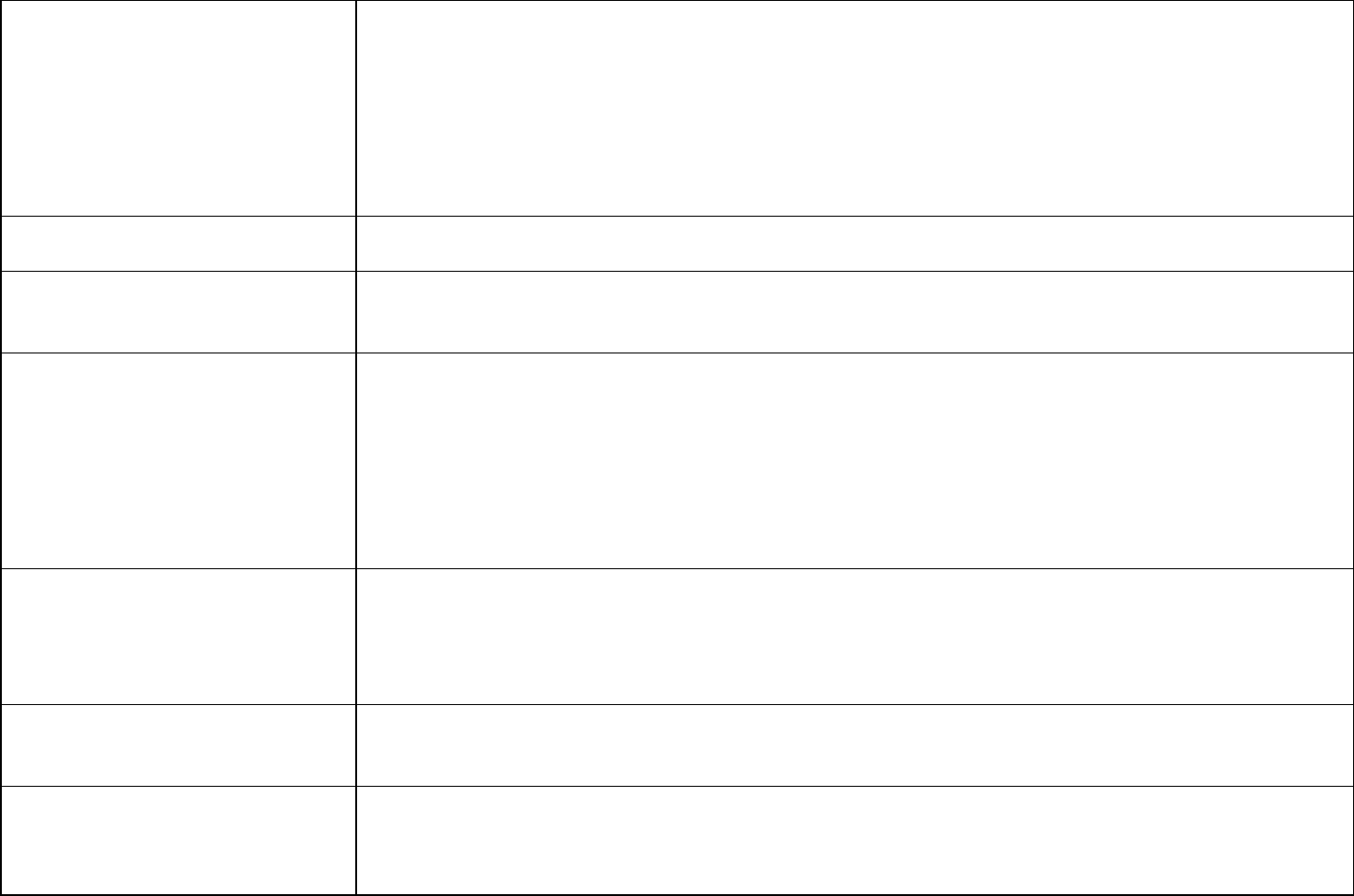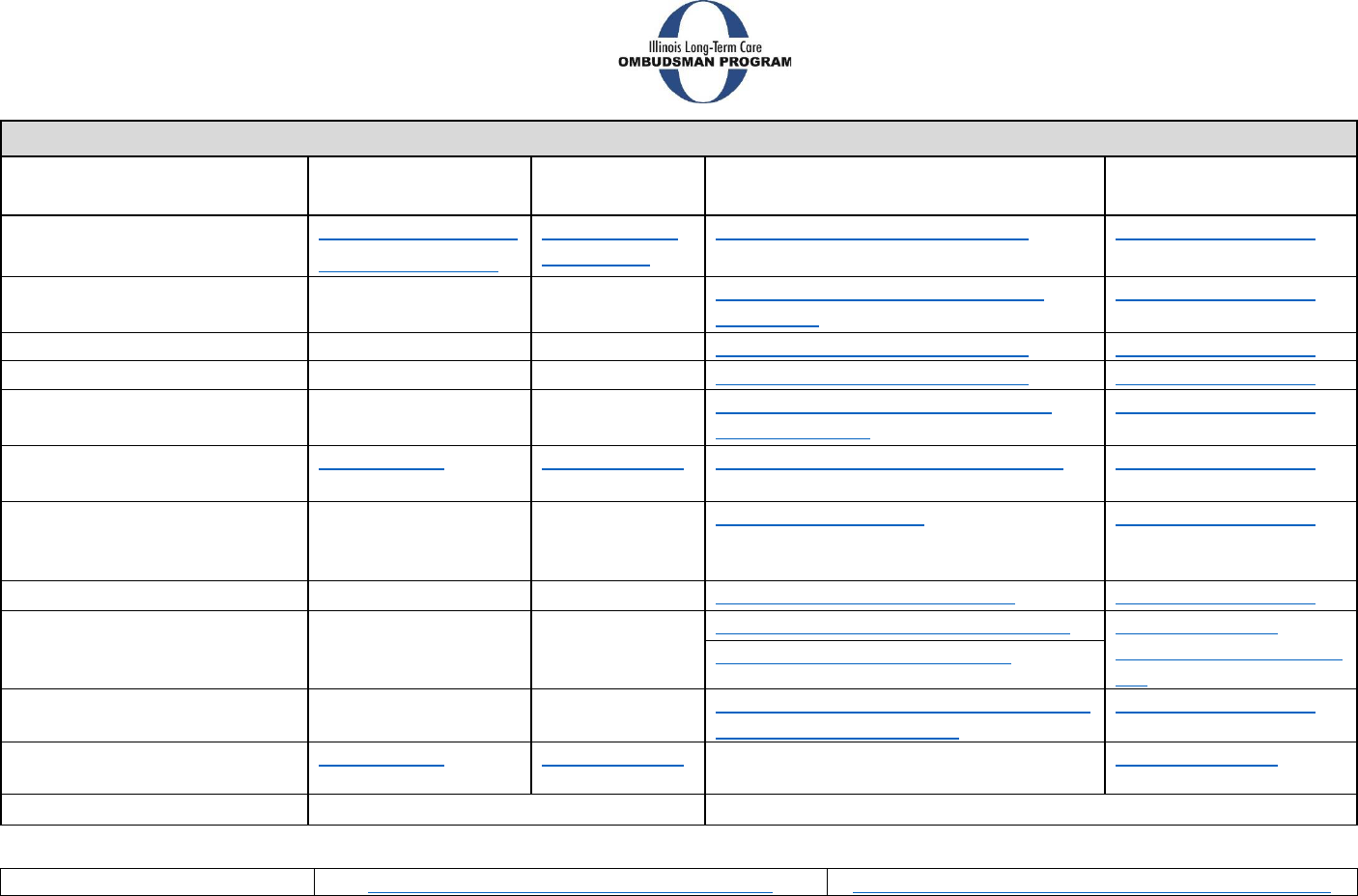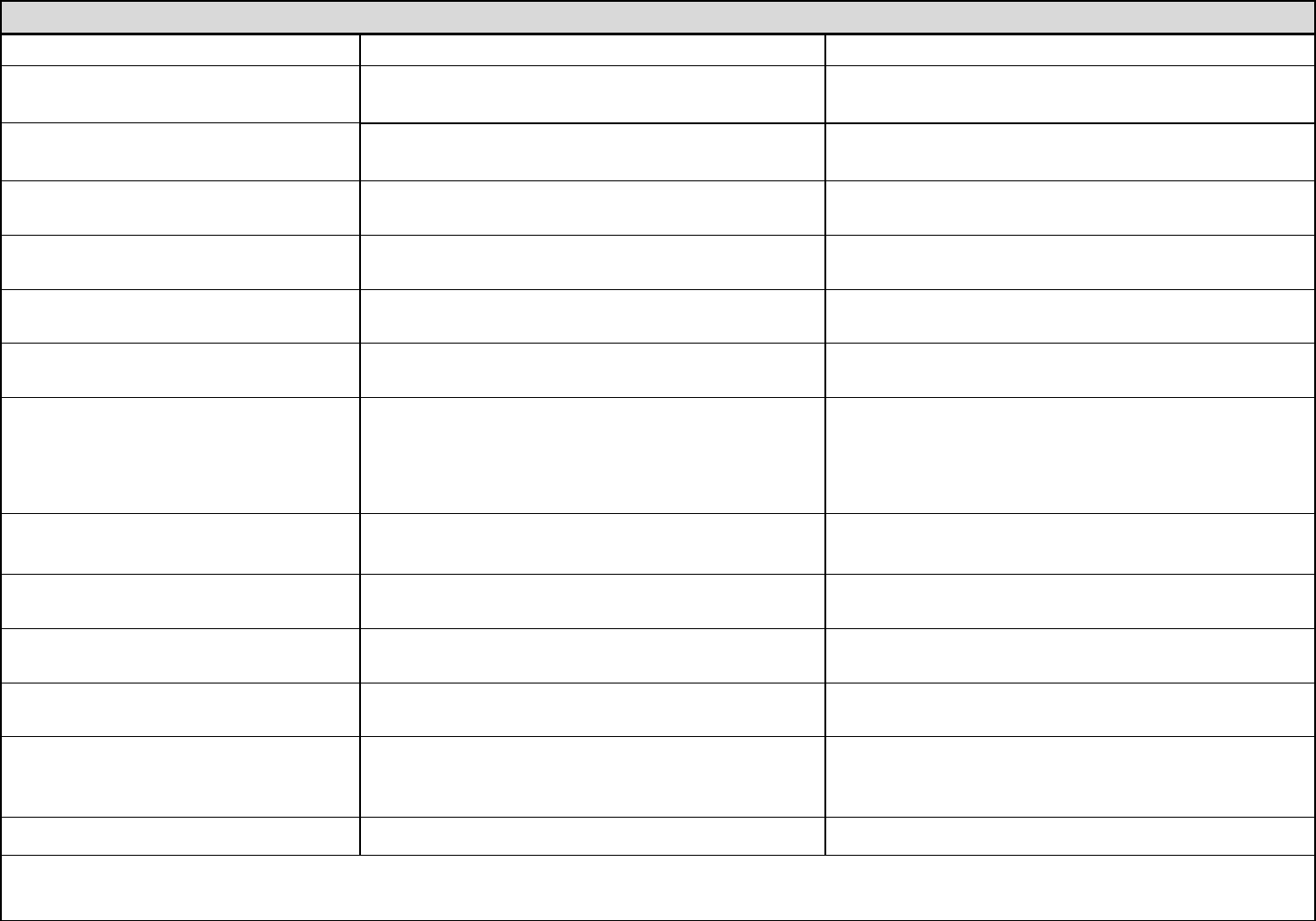
Combined 5 3 2022 jb
Illinois Long-Term Care Facility Types
Facility Type
Description
Skilled Nursing Facilities
Skilled nursing facilities provide nursing and therapy care that can only be performed by a skilled or licensed
professional such as a registered nurse or a physical therapist. Skilled care is usually short-term. Examples of
skilled care include but are not limited to physical therapy; wound care; speech therapy; and IV medication.
Individuals may have a short stay in a skilled nursing facility as part of their Medicare benefit.
Intermediate Care Facilities
Intermediate care facilities provide services and some nursing supervision in addition to help with eating,
dressing, walking or other personal needs. Medicaid may pay for intermediate care, but Medicare never
does. Some intermediate care facilities are private pay only facilities.
Assisted Living and Shared Housing
Establishments
Assisted living and shared housing establishments are community-based residential care homes that provide
care for residents who do not need the services of a nurse but who do need some help with activities of daily
living (i.e. meal preparation, getting dressed). Personal, supportive, and intermittent health-related services
are available 24 hours a day. Assisted living and shared housing establishments are private pay and are not
certified to accept Medicaid or Medicare.
Sheltered Care Facilities
Sheltered care facilities provide personal care, supervision, oversight, and a suitable activity program.
Provisions are made for periodic medical supervision and other medical services as needed. Some sheltered
care facilities are similar to assisted living establishments. Some sheltered care facilities accept only residents
who are 65 and older while some admit individuals of any age with mental illness diagnoses.
Illinois Veterans’ Homes
The Illinois Department of Veterans’ Affairs runs four (soon to be five) skilled nursing homes in the state of
Illinois. These facilities are located in Anna, LaSalle, Manteno, Quincy, and soon to open, Chicago. Each
home is licensed by the IL Dept. of Public Health and certified by the U.S. Dept. of Veterans Affairs Medical
Center of jurisdiction. Admission is based on military service as well as medical need and availability.
Specialized Mental Health
Rehabilitation Facilities
Specialized Mental health rehabilitation facilities provide rehabilitation, triage as well as crisis stabilization to
inpatient hospitalization, provide stabilization for those in post crisis stabilization, and provide transitional
living assistance to prepare those with serious mental illness to reintegrate successfully into community
living settings.

Combined 5 3 2022 jb
Intermediate Care Facilities for the
Developmentally Disabled
Intermediate Care Facilities for the Developmentally Disabled are also known as ID/DD facilities which
provide custodial care for individuals with developmental disabilities who are mobile adults and need
physical, intellectual, social, and emotional assistance. These facilities are also considered intermediate care
facilities for the intellectually disabled as the term is defined in Title XVIII and Title XIX of the federal Social
Security Act. Residents are often out of the building during normal business hours as they attend
“workshops” that provide them with an opportunity to earn a small income. Facility staff and workshop staff
work together to provide appropriate behavioral training and interventions for residents. Residents may
receive Social Security or Medicaid benefits that help pay for room and board.
Medically Complex for the
Developmentally Disabled Facilities
MC/DDs provide medically complex, personal care, and nursing to individuals of any age.
Life Care Facilities
Life Care Facilities are also known as Continuing Care Retirement Communities. These facilities are usually
on a campus setting and provide accommodations for independent living, assisted living, and nursing facility
care. Each individual care setting must meet state and federal requirements, when applicable.
Supportive Living Facilities
Established under Public Aid §.01a 5/5-5.01a. Supportive Living Facilities Program, supportive living facilities
were developed in Illinois as an alternative to assisted living and nursing homes for low-income older
persons and persons with physical disabilities under Medicaid. Supportive living facilities are similar to
assisted living establishments in terms of the care provided. The Department of Healthcare and Family
Services (HFS) has obtained a waiver to allow for services that are not routinely covered by Medicaid. The
resident is responsible for paying the cost of room and board at the facility. HFS is the regulatory agency for
supportive living facilities. A supportive living facility must designate which population it will serve: Persons
age 22-64 with a physical disability or persons age 65 or over.
Community Integrated Living
Arrangements
Community Integrated Living Arrangements (CILA) are living arrangements for adults (age 18 and older) in a
group home, family home or apartment where 8 or fewer unrelated adults with developmental disabilities
live under supervision of the community developmental services agency. Residents receive complete and
individualized residential habilitation, personal support services and supports under the direction of a
community support team within the local agency.
State Operated Developmental
Centers
State-operated developmental centers are residential programs serving people with developmental
disabilities who have severe medical and/or behavioral needs. The Department of Human Services operates
seven developmental centers that provide both mental health and developmental disability services.
Independent Living Facilities
Independent living facilities are retirement communities for healthy seniors who don’t need ongoing medical
care. Individuals live in apartments, condos, cottages, etc. and the services and amenities available vary from
facility to facility. There are usually staff members on-site at all times. These facilities are not licensed by the
state of Illinois.

Combined 5 3 2022 jb
Illinois Long-Term Care Facility Types with Corresponding Laws and Regulations
Facility Type
Federal Law
Federal
Regulation
State Law
State Regulation
Skilled Nursing and
Intermediate Care Facilities
42 U.S. Code § 1395i–3
42 CFR Part 483
Appendix PP
210 ILCS 45/ Nursing Home Care Act
77 Ill. Admin. Code 300
42 U.S. Code § 1396r
Assisted Living and Shared
Housing Establishments
210 ILCS 9/ Assisted Living and Shared
Housing Act
77 Ill. Admin. Code 295
Sheltered Care Facilities
210 ILCS 45/ Nursing Home Care Act
77 Ill. Admin. Code 330
Illinois Veterans’ Homes
210 ILCS 45/ Nursing Home Care Act
77 Ill. Admin. Code 340
Specialized Mental Health
Rehabilitation Facilities
210 ILCS 49/ Specialized Mental Health
Rehabilitation Act
77 Ill. Admin. Code 380
Intermediate Care Facilities for
the Developmentally Disabled
ICFs/IID | CMS
42 CFR Subpart I
210 ILCS 47/ ID/DD Community Care Act
77 Ill. Admin. Code 350
Medically Complex for the
Developmentally Disabled
Facilities
210 ILCS 46/ MC/DD Act
77 Ill. Admin. Code 390
Life Care Facilities
210 ILCS 40/ Life Care Facilities Act
77 Ill. Admin. Code 396
Supportive Living Facilities
305 ILSC 5-5.01a / Illinois Public Aid Code
88 Ill. Admin. Code
146.200-310 and 146.600-
710
305 ILCS 5/ Illinois Public Aid Code
Community Integrated Living
Arrangement
210 ILCS 135/ Community-Integrated Living
Arrangements Licensure Act
59 Ill. Admin. Code 115
State Operated Developmental
Center
ICFs/IID | CMS
42 CFR Subpart I
59 Ill. Admin. Code
Independent Living Facilities
Not federally regulated
Not licensed by the State of Illinois
Illinois Medicaid Resources
IDHS: Policy Manual Chapter Table of Contents
IDHS: Workers' Action Guide Chapter Table of Contents

Combined 5 3 2022 jb
Facility Types: Where can I file a complaint?
Facility Type
Regulatory Agency
Advocacy Agency
Skilled Nursing Facilities
IL Dept. of Public Health (IDPH)
1-800-252-4343 or [email protected]
IL Long-Term Care Ombudsman Program
1-888-8966 or [email protected]
Intermediate Care Facilities
IL Dept. of Public Health (IDPH)
1-800-252-4343 or [email protected]
IL Long-Term Care Ombudsman Program
1-888-8966 or [email protected]
Assisted Living and Shared Housing
Establishments
IL Dept. of Public Health (IDPH)
1-800-252-4343 or [email protected]
IL Long-Term Care Ombudsman Program
1-888-8966 or [email protected]
Sheltered Care Facilities
IL Dept. of Public Health (IDPH)
1-800-252-4343 or [email protected]
IL Long-Term Care Ombudsman Program
1-888-8966 or [email protected]
Illinois Veterans’ Homes
IL Dept. of Public Health (IDPH)
1-800-252-4343 or [email protected]
IL Long-Term Care Ombudsman Program
1-888-8966 or [email protected]
Specialized Mental Health
Rehabilitation Facilities
IL Dept. of Public Health (IDPH)
1-800-252-4343 or [email protected]
IL Long-Term Care Ombudsman Program
1-888-8966 or [email protected]
Intermediate Care Facilities for the
Developmentally Disabled
IL Dept. of Public Health (IDPH)
1-800-252-4343 or [email protected]
IL Long-Term Care Ombudsman Program
1-888-8966 or [email protected]
IL DHS Division of Developmental Disabilities
1-888-337-5267 (ask to speak to a representative)
Medically Complex for the
Developmentally Disabled Facilities
IL Dept. of Public Health (IDPH)
1-800-252-4343 or [email protected]
IL Long-Term Care Ombudsman Program
1-888-8966 or [email protected]
Life Care Facilities
IL Dept. of Public Health (IDPH)
1-800-252-4343 or [email protected]
IL Long-Term Care Ombudsman Program
1-888-8966 or [email protected]
Supportive Living Facilities
IL Dept. of Healthcare and Family Services
1-844-528-8444
IL Long-Term Care Ombudsman Program
1-888-8966 or [email protected]
Community Integrated Living
Arrangements
IL Dept. of Human Services,
Office of Inspector General 1-800-368-1463
IL DHS Division of Developmental Disabilities
1-888-337-5267 (ask to speak to a representative)
State Operated Developmental
Centers
IL Dept. of Public Health (IDPH)
1-800-252-4343 or [email protected]
DHS, Office of Inspector General 1-800-368-1463
IL DHS Division of Developmental Disabilities
1-888-337-5267 (ask to speak to a representative)
Independent Living Facilities
Local Health Department / Law Enforcement
N/A
NOTE: Equip for Equality serves as the Protection & Advocacy System in Illinois across facility settings, working as an independent watchdog over
the disability service system monitoring public and private institutions and community-based facilities and programs. www.equipforequality.org
